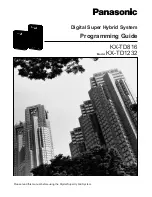
AMT/PTD/PBX/0020/2/4/EN
01/2007
Page 15
•
Radio area:
The radio area is the basic element in radio coverage. The radio area is the zone in which a base
station transmits and receives signals. However, depending on the traffic conditions (number of
simultaneous calls required within the same office), it may be necessary to install multiple base
stations adjacent to one another covering virtually the same radio area. In this case, they are
referred to as overlapping base stations. The size of each radio area varies according to the
topology.
The limits of a radio area correspond to the limits of the radio range of the base station in the
radio area. These limits are determined by the following two criteria:
1. Indicator of error rate in the transmission of the radio signal (CRC). The value of this indicator
must be 40H. If its value is lower, the limit of the radio area is reached.
2. The radio signal strength indicator (RSSI). If this level drops below 3DH while the CRC is still
at 40H, the limit of the radio area is reached.
Example:
•
Radio area centre
Location of a base station or antenna serving a radio area.
•
Radio range
The distance between the radio area centre and its perimeter. The radio range depends on the
environment.
•
Trunk group (in the DECT sense):
A group of base stations (8 maximum). A trunk group must be associated with a cell. Note that
the notion of a DECT trunk group used here is different from that usually associated with a PBX.
•
Cell
The cell, to the PBX, represents a set of base stations. It constitutes the basic mobile roaming
entity. The PBX recognizes the cell in which a given mobile is located and not the radio area (that
is, the base station on which the mobile is locked). When the PBX sends a message to a mobile,
it broadcasts it to all base stations in the cell. Consequently, a cell generally represents a
homogeneous space.
One cell contains a maximum of 8 base stations. For an initial installation, the recommendation is
to limit the number of base stations to between 4 and 6 per cell, to allow for future expansion.
CRC < 40H
Base station
Movement of a mobile
RSSI < 3DH
Summary of Contents for NeXspan 50
Page 2: ...Page 2 01 2007 AMT PTD PBX 0020 2 4 EN ...
Page 20: ...Page 20 01 2007 AMT PTD PBX 0020 2 4 EN ...
Page 66: ...Page 66 01 2007 AMT PTD PBX 0020 2 4 EN ...
Page 70: ...Page 70 01 2007 AMT PTD PBX 0020 2 4 EN Figure 4 2 Bottom view of the LD4 ST card ...
Page 134: ...Page 134 01 2007 AMT PTD PBX 0020 2 4 EN ...
















































